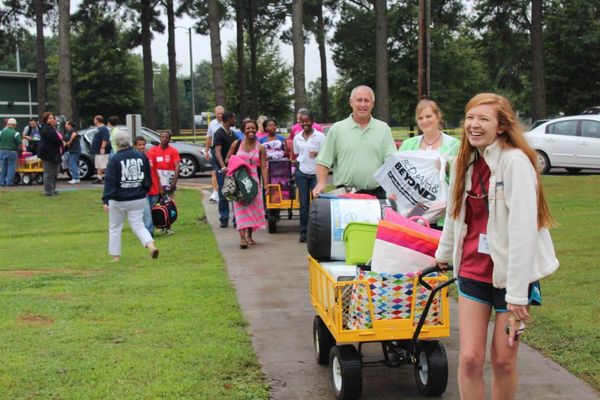Being an Athletic Training major as a freshman can be a bit overwhelming. There is so much to think about. You constantly worry about the billions of things going on for everyone in the major and you always have getting into the professional phase on your mind. There’s no escaping the torture of waiting. In the end, you learn a lot as a freshman about what the next 4 years of your life are going to be like.
You will be a part of the AT Club and you will wake up for your 7 am meetings. Like it or not.
Being an AT major means being in the AT Club. This is a mandatory club with mandatory 7 am meetings. You don’t really mind waking up seeing as you really would have been awake for your 8 am class anyways. That is unless you didn’t have class until 12:30. In which case you drag yourself out of bed and to the meeting and afterward go right back to sleep. These meetings are painfully early and have a lot to do with more upperclassmen stuff but you get a lot of opportunities through the club and the meetings. In the end, I guess they aren’t terrible.
Tape. Tape everywhere.
Tape is your new best friend. Wherever you go, you seem to have tape with you. When people walk into your room they see the stacks of it and don’t know what to say. You usually get the “Oh you’re an athletic training major aren’t you?”, as if it were a bad thing. Even when you do laundry you will find little bits and pieces of strings of tape on your clothes and have to pick it off. Tape becomes like having your wallet when you leave the house, without it, you feel empty and like you’re missing something.
Anatomy should be easier for you because AT revolves around it but you secretly hate it.
Anatomy is really hard. You try to tell yourself that it will get easier because you go over it so much but it never does. However, since it is such a big part of Athletic Training you spend a lot of your study time focusing on anatomy. It would probably look bad to fail anatomy as an Athletic Training major. So, you hide away your hate for it and hope that if you pretend to love it you eventually will.
You find yourself explaining what an AT is to everybody who asks what your major is.
“Oh, you’re an Athletic Training major, so like a personal trainer right?” No, I am not a personal trainer. If I was I would have just said so. Athletic Trainers are health care professionals who work with physicians in order to achieve prevention, emergency care, clinical diagnosis, therapeutic intervention, and rehabilitation of injuries and medical conditions. I do not make workouts for people.
You already dread clinical even though it hasn’t even started yet.
Just talking to upperclassmen gets you stressed out about clinical. It takes up so much time! How am I supposed to get that many hours in?! You figure that by the end of the school year you will have a good idea of how to make it work with the help of upperclassmen friends and your advisor and you try to put off thinking about them until then.
Practice Practice Practice.
At any moment in
Your friends try to get you to diagnose them when you don’t have the ability to yet.
“No, I am only a freshman. I do not have the ability to diagnose anything yet” If you’re lucky you have one class that is directly related to treating patients under your belt. As much as your
Classes like English you just don’t care about.
I mean come on. English? Why do I have to know how to write a
Where are you even going to work?!
Yes, there are jobs out there. Many different kinds of jobs. You know this but many people don’t. You get asked a lot if there are even any places to work in Athletic Training anymore. They don’t realize that you don’t have to just work with the stereotypical athletes. You can work with so many types of people. You can work with the army, professional teams, colleges, high schools, fine arts, sports medicine clinics, hospital emergency rooms, occupational settings, law enforcement, and even physician offices. There are a wide variety of places you can work.
You spend a lot of time thinking about AT class.
When you wake up, in classes, at breakfast, lunch, dinner, basically any time is time to think about what is happening in AT class. You think about the taping technique you learned last class or the one you are going to learn at the next one. You think about practicals, oh you think about them a lot. It becomes all that you think about and soon when you start to learn more and more you start to analyze everyone you see and what injuries they may have had or are having.





















